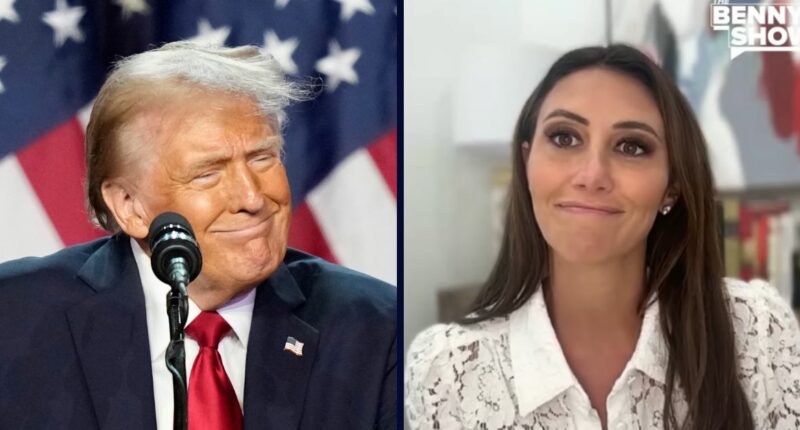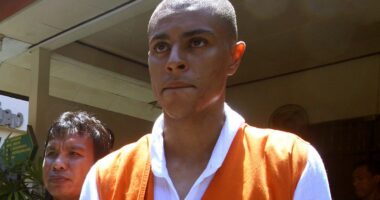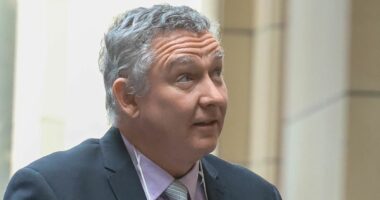Share this @internewscast.com
On the left, Donald Trump delivers a speech at an election night watch event on Wednesday, Nov. 6, 2024, in West Palm Beach, Fla. (AP Photo/Alex Brandon). On the right, Alina Habba is shown discussing federal judges’ decision against extending her role as New Jersey’s chief prosecutor (The Benny Show/YouTube).
Ahead of upcoming oral proceedings, a collective of 10 former U.S. attorneys have expressed support for criminal defendants, arguing that President Donald Trump’s previous personal lawyer, Alina Habba, was justly barred from prosecuting them due to her improper appointment as acting U.S. attorney for New Jersey.
The Department of Justice is set to present its case at the 3rd U.S. Circuit Court of Appeals on Oct. 20. The former U.S. attorneys, including Donald Ayer, a past supervisor of Bill Barr, Harry Litman, MSNBC legal commentator Barbara McQuade, and Bill Weld, asserted that the role of U.S. attorney “should be occupied only by individuals with experience and competence,” not by someone who is “inexperienced” or otherwise “unsuitable” for the position.
Highlighting the broad powers U.S. attorneys hold that can affect the lives, freedoms, and assets of countless people within their jurisdictions, the amici curiae, or court friends, asserted that Judge Brann’s decision to favor criminal defendants Julien Giraud Jr., Julien Giraud III, and Cesar Pina was appropriate.
The brief further argued that any deviation from this would permit the president to “legally circumvent” the Senate’s advisory and consent responsibilities as mandated by the Constitution.
Habba was initially appointed as interim U.S. attorney in March, a provisional post limited to a 120-day period unless confirmed by the Senate or appointed by a federal court. With her nomination stalling in the Senate and as her interim appointment neared its end in July, federal judges opted not to appoint her, instead choosing her then-chief deputy, Desiree Grace, to serve as U.S. attorney.
U.S. Attorney General Pam Bondi, claiming that “politically minded” and “rogue judges” had interfered with Trump’s “core Article II powers,” swiftly fired Grace. After Trump pulled Habba’s nomination as permanent U.S. attorney, Habba resigned as interim U.S. attorney and was appointed simultaneously to the ousted first assistant’s position under the Federal Vacancies Reform Act (FVRA), making her the top prosecutor again.
At the same time, in the event that legal authority was challenged, Habba was named a “Special Attorney to the United States Attorney General” under a federal statute governing the commission of special attorneys, giving her the power to act as a U.S. attorney through another means as the office’s supervisor.
Brann called it a “novel series of legal and personnel moves” that could enable the president to handpick, regardless of qualifications, his “personal choice for an entire term without seeking the Senate’s advice and consent.”
The former U.S. attorneys agreed that the government ran roughshod over the FVRA — a “carefully drafted statutory scheme” — and the purpose of the Appointments Clause of the Constitution.
“Amici categorically reject the Administration’s claim that the President can legally bypass Congress’s carefully drafted statutory scheme,” the brief said. “Acceptance of this argument would not only contravene statutory restrictions and the Appointments Clause of the United States Constitution, but as a policy matter, it would create the very danger that the Appointments Clause was drafted to address: the appointment of ‘unfit characters’ to critical Executive Branch positions.”
U.S. attorney, after all, is a serious job that should be “free from actual or perceived political interference and favoritism,” the brief continued.
“The job of the U.S. Attorney is not one that can be learned on the fly by a neophyte,” the brief said. “The job of a U.S. Attorney is unusually powerful, often involving life or death decisions for those within their jurisdictions.”
The Trump administration has opposed Brann’s interpretation of the FVRA, one that DOJ said could “cripple the functioning of government” if it stands up to appellate scrutiny.
The amicus brief filed Monday comes as DOJ is separately appealing the disqualification of Sigal Chattah in Nevada, a ruling that cited the Girauds’ case, and while fending off additional challenges.
















